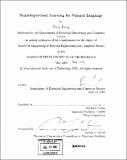Semi-supervised learning for natural language
Author(s)
Liang, Percy
DownloadFull printable version (4.079Mb)
Other Contributors
Massachusetts Institute of Technology. Dept. of Electrical Engineering and Computer Science.
Advisor
Michael Collins.
Terms of use
Metadata
Show full item recordAbstract
Statistical supervised learning techniques have been successful for many natural language processing tasks, but they require labeled datasets, which can be expensive to obtain. On the other hand, unlabeled data (raw text) is often available "for free" in large quantities. Unlabeled data has shown promise in improving the performance of a number of tasks, e.g. word sense disambiguation, information extraction, and natural language parsing. In this thesis, we focus on two segmentation tasks, named-entity recognition and Chinese word segmentation. The goal of named-entity recognition is to detect and classify names of people, organizations, and locations in a sentence. The goal of Chinese word segmentation is to find the word boundaries in a sentence that has been written as a string of characters without spaces. Our approach is as follows: In a preprocessing step, we use raw text to cluster words and calculate mutual information statistics. The output of this step is then used as features in a supervised model, specifically a global linear model trained using the Perception algorithm. We also compare Markov and semi-Markov models on the two segmentation tasks. Our results show that features derived from unlabeled data substantially improves performance, both in terms of reducing the amount of labeled data needed to achieve a certain performance level and in terms of reducing the error using a fixed amount of labeled data. We find that sometimes semi-Markov models can also improve performance over Markov models.
Description
Thesis (M. Eng.)--Massachusetts Institute of Technology, Dept. of Electrical Engineering and Computer Science, 2005. Includes bibliographical references (p. 75-82).
Date issued
2005Department
Massachusetts Institute of Technology. Department of Electrical Engineering and Computer SciencePublisher
Massachusetts Institute of Technology
Keywords
Electrical Engineering and Computer Science.